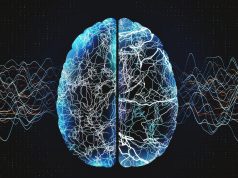Smaller hippocampal, Alzheimer’s signature region volumes seen 24 years after inflammation noted
THURSDAY, Nov. 2, 2017 (HealthDay News) — Systemic inflammation in midlife is associated with future neurodegeneration and cognitive aging, according to a study published online Nov. 1 in Neurology.
Keenan A. Walker, Ph.D., from Johns Hopkins University School of Medicine in Baltimore, and colleagues assessed plasma levels of systemic inflammatory markers at baseline in 1,633 participants enrolled in the Atherosclerosis Risk in Communities Study. Five inflammatory markers were used to create an inflammation composite score for each participant (fibrinogen, albumin, white blood cell count, von Willebrand factor, and Factor VIII). Episodic memory and regional brain volumes were assessed 24 years later.
The researchers found that 24 years later, there were 1,788 mm³ greater ventricular, 110 mm³ smaller hippocampal, 519 mm³ smaller occipital, and 532 mm³ smaller Alzheimer’s disease signature region volumes and reduced episodic memory in association with each standard deviation increase in midlife inflammation composite score. Participants with elevation in three or more markers, compared to those with no elevated midlife inflammatory markers, had, on average, 5 percent smaller hippocampal and Alzheimer’s disease signature region volumes. Age and race modified the association between midlife inflammation and late-life brain volume, with young and white participants who had higher levels of systemic inflammation during midlife more likely to show reduced brain volumes.
“Our prospective findings provide evidence for what may be an early contributory role of systemic inflammation in neurodegeneration and cognitive aging,” the authors write.
Two authors disclosed ties to the pharmaceutical industry.
Copyright © 2017 HealthDay. All rights reserved.








